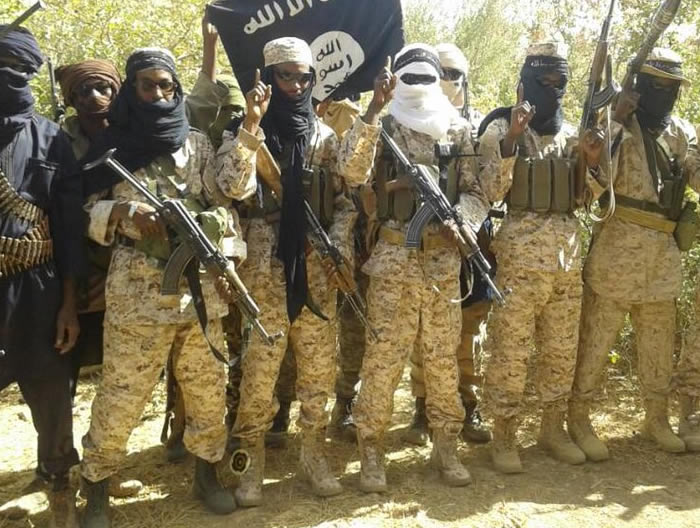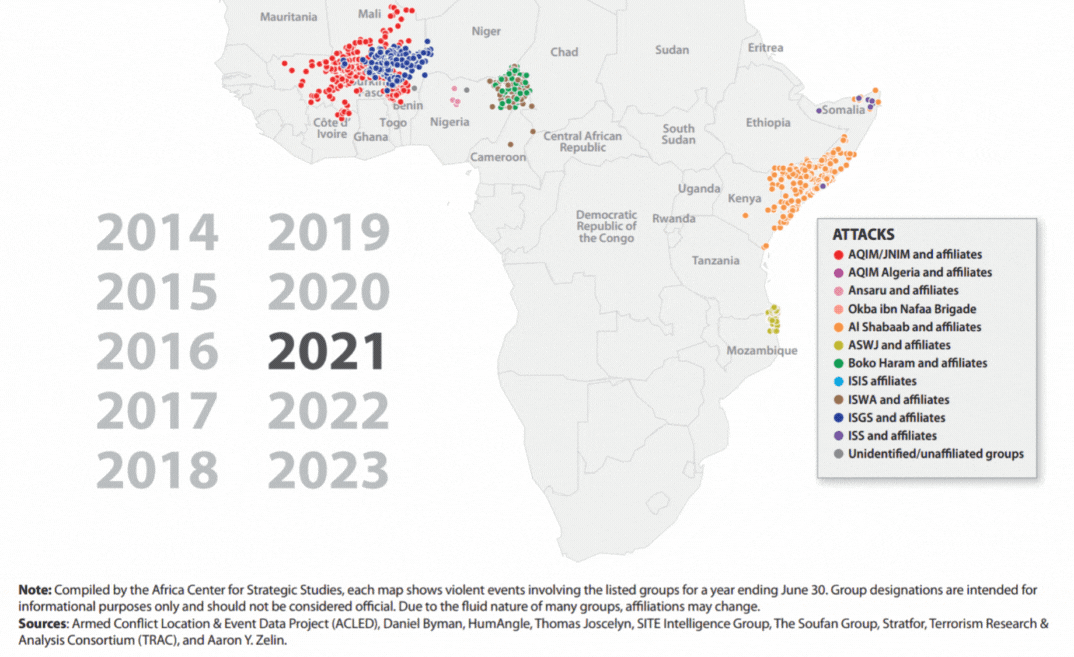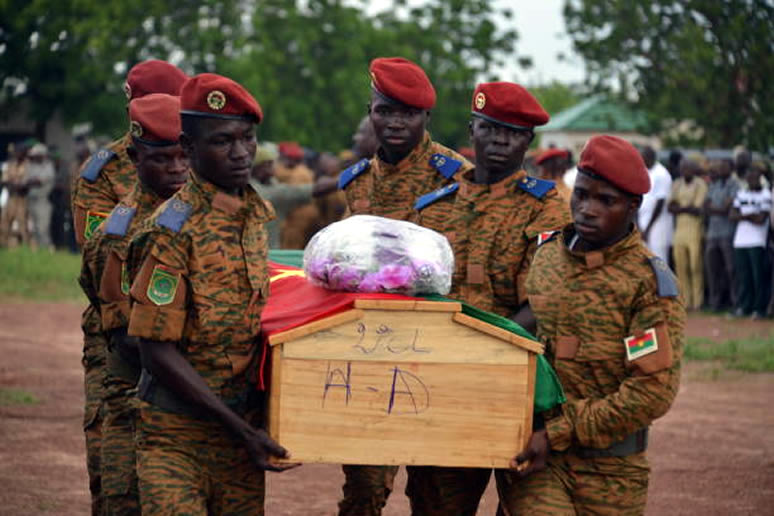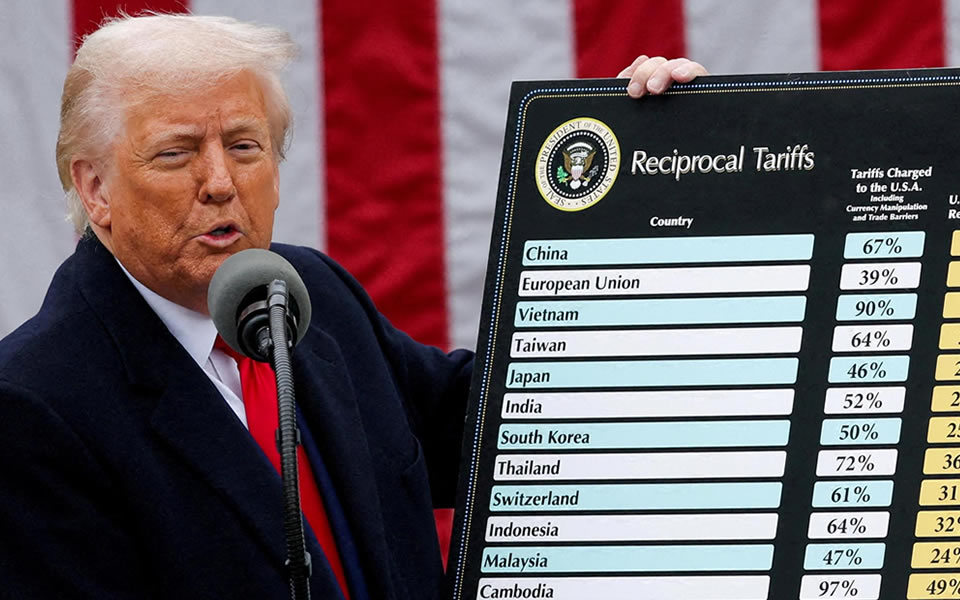
Global Health Alert: Sharp Rise in Norovirus Cases
March 4, 2024
Extremism in the Sahel – Focus on JNIM
March 14, 2024EXTREMISM IN THE SAHEL – FOCUS ON ISLAMIC STATE SAHEL PROVINCE (ISSP)
Analysts: Khadijah Mustapha & Cleopatra O.
Senior Editor: Magdalena Breyer
What You Should Know
- Operational Region: Islamic State Sahel Province (ISSP) is primarily operational in Liptako-Gourma, the border region spanning Mali, Niger, and Burkina Faso. It maintains semi-autonomous cells in Gao and Menaka, Mali; Oudalan and Seno, Burkina Faso; and Tillaberi and Tahoua, Niger.
- Goals: ISSP’s focus is on territorial consolidation and expansion with aims of establishing a transnational caliphate.
- Shift in Tactics in 2023: The group experienced a 4.05% reduction in overall activities, maintaining a consistent distribution of tactics, with attacks at 27.45%, armed clashes at 24.18%, looting at 20.63%, and forced disappearances at 6.82%. Despite comprising only 2.96% of activities, the use of IEDs increased by 55% from 2022, likely resulting in the 54% rise in drone strikes by military forces in the region.
- Expansion in 2023: Since 2022, ISSP has actively reclaimed territories from Jama'at Nasr al-Islam wal Muslimin (JNIM), expanding its influence into neighbouring countries such as Togo, Benin, and Guinea, and establishing significant bases in Nigerien villages of In-Araban, Infoukaretane, and Akabar. Compared to 2022 figures, Niger and Burkina Faso have respectively surpassed Mali in rates of incidents and fatalities, very likely indicating a broadening scope of activities.
- 2024 Regional Forecast: ISSP's efforts to consolidate control over existing territories and expand its influence have contributed to the spread of jihadist insecurity to coastal Sahel states like Togo and Benin, very likely taking advantage of the region's political instability. ISSP will very likely use more technically advanced methods to further expand their territory. The group’s reluctance for dialogue will likely hinder future alliances with regional jihadist groups, possibly increasing animosity with JNIM. Uncertainties in regional alliances will likely increase because of unclear Africa Corps-Wagner dynamics in the region.
Introduction
Once a semi-autonomous branch of ISWAP, ISSP aimed to consolidate existing territories and expand its sphere of influence in 2023 after becoming an independent province in March 2022. Despite fewer attacks, ISSP targeted a wider range of regions compared to the previous year.
This assessment briefly examines the activities, tactics, and impacts of ISSP’s presence in the Sahel. As ISSP seeks to establish itself as a credible province in the Liptako-Gourma region of the Sahel, understanding its regional impact is critical in light of recent political and diplomatic changes that have altered the broader regional and security dynamics.

Areas of Operation
ISSP is mainly active in the Tri-Border area, which covers parts of northern Mali, and the Liptako-Gourma region in Burkina Faso and Niger. Particularly in Seno, Oudala, Gao, Ansongo and Soum districts in the Tri-Border area, Namentenga in North Central Burkina Faso, Tillia, Ouallam, and Banibangou in Western Niger, and more recently, Point Triple in Northern Benin Republic.

The map above shows the violent events recorded in Africa according to the violent actors.
Key Events in 2023
March 2022
ISSP declares itself an independent province; no longer a branch of ISWAP.April, 2023
ISSP captures Tidermène, Mali. This signifies the last stage of a successful offensive that started in 2022, against their biggest opposition, JNIM.May, 2023
ISSP takes control of most villages surrounding Ménaka, Mali, leaving only the city untouched, as they had been in conflict with JNIM over this region.
Tactics and Techniques
Attacks & Ambushes
Battle & Armed Clashes
Looting & Property Destruction
Abductions
Explosions
Attacks & Ambushes
The organisation extensively employs swarming tactics, leveraging their numerical strength. Their strategy involved executing ambushes and surprise raids, and their utilisation of motorcycles and other vehicles made them an exceptionally mobile and adaptable force. Furthermore, they demonstrated expertise in conventional military operations, exemplified by their capacity to capture and govern rural areas, as evidenced in the takeover of Tidermene in Menaka and various other strategic locations.
Battle & Armed Clashes
The group actively participated in armed clashes with military forces and local rival armed groups, employing firearms and sophisticated artillery to assert their influence. These weapons are often acquired through various means, including illicit arms trafficking networks within conflict zones and raids on military or police armouries.
Looting & Property Destruction
Another tactic employed by the group was looting and destruction of properties, including the burning of farm lands, poisoning of water sources, and cattle rustling. This strategy serves as an intimidation technique to destabilise the population and as a means of acquiring resources.
Abductions
The group engaged in abduction to exert control over existing territories and instil fear among people in various targets for territorial expansion. Their victims included military personnel, villagers, foreigners, and individuals labelled as "unbelievers." Victims of abduction are often subjected to harsh treatment, and the group has been known to execute captives. Abduction for ransom is utilised as a lucrative source of funding for their operations.
Explosions
The group was associated with infrequent explosive incidents, particularly through the use of vehicle-borne improvised explosive devices (VBIEDs). These attacks primarily targeted military bases and rival insurgent groups such as JNIM, demonstrating the group's capability to employ sophisticated tactics to achieve their objectives.
ISSP’s Impact in 2023
This escalation can likely be attributed to the actions of terrorist groups operating in the area, as reported in the IOM’s Displacement Tracking Matrix Dashboard for Liptako-Gourma.The actions of ISSP caused considerable distress among the civilian population in 2023 through abductions, lack of religious freedom, looting, and extreme taxation during pre-existing economic hardship. In 2023, ISSP-associated incidents resulted in a total of 3084 fatalities, marking a 36.7% decrease compared to the fatalities recorded from January 1 to December 31, 2022. The noted decline is likely a consequence of the group's prioritisation of establishing governance structures within the regions already under their control. In the region bordering Burkina Faso, Mali, and Niger in Central Sahel, the number of displaced individuals rose from approximately 2.7 million in December 2022 to nearly 3 million by August 2023.
These displaced individuals are forced to leave their homes and have limited access to food, water, and other basic services like education and healthcare. For those who remain or return to the territories taken over by ISSP, economic activities are disrupted. These individuals face limited access to farmlands and wider transport networks due to ISSP blockades, frequent cattle rustling, and the imposition of heavy taxes (Zakat). ISSP’s human rights violations encompass executions, looting, amputations, and restriction to freedom of religion. These actions have significantly worsened the humanitarian crisis in the region, severely impacting locals' access to livelihood opportunities.

Several thousand troops of the Armed Forces of Mali, Niger & Burkina Faso have been killed during engagements with insurgent groups like the ISSP over the past decade.
Opponents & Collaborators in 2023
The main opponents of ISSP in 2023 were the military forces of Niger, Burkina Faso, and Mali, the JNIM (Group for Support of Islam and Muslims), MSA (Movement for Azawad Salvation), and the VDP (Volunteers for the Defense of Homeland).
ISSP considers other regional jihadist groups as illegitimate and refuses dialogue and long-term collaboration.
Forecast
ISSP is very likely to persist in its endeavours aimed at consolidating its presence in the Liptako-Gourma region and expanding its sphere of influence to neighbouring countries like Togo, Benin, and Guinea. This will likely involve clashes with military and opposing jihadist groups to solidify control over key territories within Liptako-Gourma. This expansion strategy will likely take advantage of the power vacuum caused by the absence of Western counterterrorism actors and utilise existing ethnic conflict to infiltrate the new territories, likely leading to heightened conflict and security concerns in the targeted regions. ISSP will likely strategically improve and employ more sophisticated methods like VIEDs and other explosives in confrontations with military targets and other jihadist groups, likely indicating a move towards more precise and advanced tactics.
The collaboration between Wagner and Alliance of Sahel States (AES) bloc in counterterrorism activities will likely challenge ISSP’s regional expansion goals, likely resulting in increasing opposition and potential setbacks for the group’s regional ambitions. The introduction of Africa Corp is likely to increase this uncertainty as it is unclear if the group will replace, rebrand, or work alongside Wagner. ISSP is unlikely to engage in collaborative dialogue with other regional jihadist groups, possibly hindering the group's ability to form alliances with potential partners and its prospects for further territorial expansion. This stance will possibly increase the animosity between ISSP and JNIM, possibly alienating potential allies and sympathisers hesitant to align with ISSP's rigid position.



